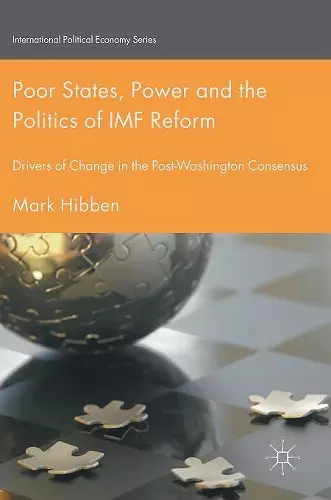Poor States, Power and the Politics of IMF Reform
Drivers of Change in the Post- Washington Consensus
Format:Hardback
Publisher:Palgrave Macmillan
Published:17th Jun '16
Currently unavailable, and unfortunately no date known when it will be back

"A too often forgotten aspect of IMF lending activities is the funding arrangements between the powerful global financial institution and the poorest of the poor countries in the world. Mark Hibben sheds needed light on this under-researched and under-theorized relationship. The timing of this book is critical as the IMF expands its influence and power in the least developing countries and as post-2008 global normative changes have altered the Washington consensus into a kinder and more gentle IMF that is yet, ironically, potentially more involved in socioeconomic policy areas than previous development decades." (Bessma Momani, University of Waterloo, Canada) "With admirable clarity and respect for the unique strengths of three major analytical traditions in IPE, Hibben examines changing policy regimes within the IMF to assess how, why, and how much its approach to global poverty has changed since the heyday of the Washington Consensus." (Mark Rupert, Syracuse University, USA)
This books provides a timely comparative case study that reveals the factors driving the International Monetary Fund's policy reform in Low Income Developing Countries (LIDCs), as a resurgent IMF expands its footprint in the world's poorest states.This books provides a timely comparative case study that reveals the factors driving the International Monetary Fund's policy reform in Low Income Developing Countries (LIDCs), as a resurgent IMF expands its footprint in the world's poorest states. Through a research design that employs both mainstream and critical IPE theory, Mark Hibben uncovers three major tendencies. Principal-agent analysis, he argues, demonstrates that coalition formation among powerful states, IMF staff and management, and other influential actors is necessary for policy reform. At the same time, he uses constructivist analysis to show that ideational frameworks of what merits appropriate macroeconomic policy response also have an impact on reform efforts, and that IMF management and staff seek legitimacy in their policy choices. In response to the crises in 1999 and 2008, the author maintains, poverty and inequality now 'matter' in IMF thinking and serve as an opportunity for policy insiders and external actors to deepen the institution's new commitment to 'inclusive' growth. Finally, Hibben draws on neo-Gramscian analysis to highlight how the IMF looked to soften the destabilizing effects of globalization through reforms focused on stakeholder participation in poor states and will continue to do so in its support of the new United Nation Sustainable Development Goals. This means that the 2015-2030 time period will be a critical juncture for IMF LIDC reform. By drawing from diverse theoretical traditions, the author thus provides a unique framework for the study of contemporary IMF change and how best those interested in LIDC policy reform can meet this objective.
ISBN: 9781137577498
Dimensions: unknown
Weight: 3695g
185 pages
1st ed. 2016